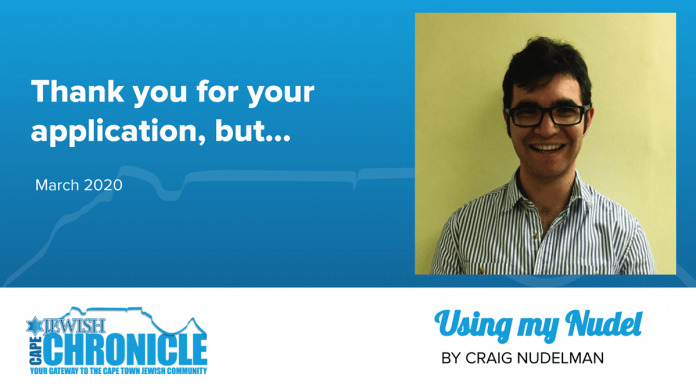This line is one that I’m sure everyone has seen at least once in their lives. The dreaded words signifying that you were not chosen for the position, the job, scholarship, bursary, or journal.
Well, you know how it goes. Why? Why was I not picked for this? I filled all the criteria, I ticked all the boxes. And also, how could I improve so I can get the opportunity next time, if it arises? Why was I not accepted?
Acceptance is something which we crave. It is almost a personal indication that we are successful and can rise to the occasion. Ohio State University’s C. Nathan DeWall and Brad J. Bushman’s recent psychological research on social acceptance and rejection was published in Current Directions in Psychological Science. DeWall suggests that acceptance is part of our need to belong to a particular social group, which is from our early ancestors.
He states, “We have weak claws, little fur, and long childhoods; living in a group helped early humans survive harsh environments. Because of that, being part of a group still helps people feel safe and protected, even when walls and clothing have made it easier for one man to be an island entire of himself.” The fact that we are included in something makes us feel good about ourselves. He continues to say that belonging has different parts.
An important one is about people needing “positive regular social contact”. This not only enabled early humans to evolve in those harsh environments mentioned above, but it allowed them the ability to ease the other’s responsibility, through sharing and cooperation. But social rejection is a much bigger issue, and the implications can be heavy. In early human societies, social exclusion and rejection meant a lower survival rate. Sometimes, social rejection even signified a death sentence, says DeWall. He uses ancient Greece as an example, whereby exile and death were “treated as equal punishments”.
Ethan Cross of the University of Michigan used MRIs to see how physical pain and emotional pain are linked. He explains that instead of the evolving human creating a whole new system to deal with emotional pain, “evolution simply co-opted the system for physical pain”. He continues, “Given the shared overlap, it follows that if you numb people to one type of pain, it should also numb them to the other type of pain.”
And numbing people to pain is exactly what social rejection can do. Elitsa Dermendzhiyska, a mental health researcher and writer, writes about how Roy Baumeister. While conducting experiments in the 1990s, he saw that once people had been rejected over and over again, they became emotionally numb. After many experiments conducted, Baumeister called this ‘ego-shock’; similar to the numbness you feel after a physical injury. Dermendzhiyska gives the example of cutting oneself on a can of tuna. You might feel nothing at first; it’s as if for a brief moment one’s body shuts down to shield one against the pain.
Writing about this topic gave me a lot to think about. It showed me that those who have been repeatedly rejected should be given a lot of respect. The emotional state of going through the same trauma again and again is taxing, both emotionally and physically. The fact that people are able to get back on their feet and find the strength to do it all over again is testimony to their indomitable spirit.
So when you read that email and feel your world turning upside down, just know that there’s something else out there to look forward to. I know from experience. It’s a hard world and just getting up in the morning might be a struggle. But in the words of Rebbe Nachman of Bratslav: “Jews, it is forbidden to despair.”
And now for a brief “Thank you!”
This is my 50th column in the Cape Jewish Chronicle, and I just wanted to say thank you to a few people. First of all, thank you to Lindy, the most wonderful editor, who has put up with me over the past four and a half years. You are an incredible and patient person, and I am lucky to have you as a close friend. I also want to thank all the readers of my columns. It’s always nice to have people remark on a particularly good piece of writing. That is due to my two incredible editors; My mom, Jill, with her red remarks over my grammar and syntax led me to better my writing capabilities. My wife, Gabi, has put up with me saying, “What am I going to write about this month?” for many, many months. She is an amazing wife, mother, and a wonderful and inspirational person. I love her and my two beautiful daughters
very much.
Thank you all for the support and for making me keep on writing. I appreciate it greatly and hopefully will thank you for my 100th column!
To read or download the full March issue PDF of the Chronicle, click here
To read the Editor’s column for March, click here
To read the most read article of the February issue, click here
Portal to the Jewish Community: to see a list of all the Jewish organisations in Cape Town with links to their websites, click here











